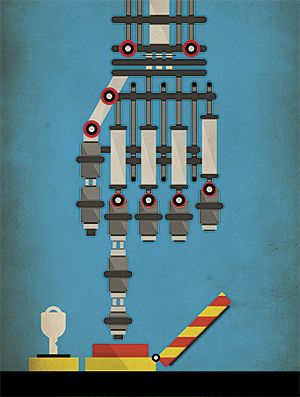THE GOTH GIRL HAS RABBIT EARS
I started this short story last night after a day-long adventure yesterday with my youngest daughter. She was the inspiration for the story although the main character has been changed around quite a bit, and is really a composite character. This part is the first draft of the introductory section though I shall not post anymore of the story here because I plan to finish writing it and then submit it for publication. Probably, given my other work-loads, in the next couple of weeks.
The Goth Girl Has Rabbit Ears is a phrase I now apply to my youngest daughter and I am thinking I will use it here as both a stand alone short story, and as an on-going idea(l) in my youth/young adult series of books entitled The Totally Random Childhood Adventures of Sweet Katie Awesome.
I hope you enjoy this introduction and that the story interests you.
Have a good weekend folks.
THE GOTH GIRL HAS RABBIT EARS
Her boots were parade issue patent-leather black, her pants were deep sea wine-dark, her blouse was sable and silver and see through near her navel, her hair was jet-black, tousled-curly and plentiful, stretching half-way down her back and partially gathered like an uneven inky crown in a sprouting fountain atop her much-troubled calvaria, her eyes were coal-deep and banners of baffled boredom, her face and arms were sugar-pastry white (they would have been her habitual pasty-white but her father had made her spend at least one hour a day outside over the past week – she insisted she hated that as it unnaturally tanned her), her nails and toes were all painted like raw, dusty slate, except for the one on each hand and foot that was jaundiced yellow, and her blood red lips matched the sanguine, thrice-inscribed rough-cut crystal talisman she wore around her neck.
She also sported a silver-smooth moon amulet on her right wrist and the remains of her grandmother’s old rosary on her left forearm (wrapped tightly there like an antique torc) to ward off those tiresome and insipid boys who thought she “looked cool or sexy.” Sometimes it even worked. To her amazement, her delight, her disbelief, and, of course, her typical regret.
Of all things that she found most distasteful though she hated above everything else to have adventures (as her father liked to call them). How bourgeois and burgher-like she would proclaim any time anyone other than her old man even dared mention “an adventure.”
“I am legally obligated to kill you,” she would nonchalantly exclaim to everyone else “if you even suggest such a thing in my presence.”
Her second favorite declaration at the suggestion of an actual adventure was to look languidly side and slow-eyed at the offender and to announce, “Now we’re gonna fight.” She never did of course, out of an old-fashioned sense of religious and dutiful disinterest. But she did entertain the thought often in her imagination. It made her want to smile and to train for hand to hand combat, though she was very careful to never attempt those things either.
Nevertheless, secretly, and deep in her arcane soul of souls, she loved adventures. She would never admit that out loud to anyone else, or even much to herself, as she disdained the very thought of what to her was “so common.” For her primary mistake in life thus far was to blindly assume that most people like have adventures. Or that they had any interest in them at all. Almost no one does. Not real ones anyway. However she was sure, given her experiences with her father, and a few of her friends, that everyone loved to seek out and execute adventures. And the thought of that made her very uneasy. After all she did not ever want to intentionally appear bourgeois and burgher-like.
She thought, in her obdurate mind of minds, that raves and ecstasy parties and urban slam poetry contests and week-long, anemic semi-political/semi-philosophical Goth vampire games, and hole-in-your-clothes midnight club gigs, and a general disdain for all normal human society just naturally qualified as either a real adventure, or as some kind of higher substitute for the basic human enterprise. Obviously, as you and I know, they are and do not. But she was young and jaded and searching for the cracks in reality and still eating lotus and had attended public school. Much like most modern kids. So you can fairly allow her some leeway if you wish. I did, and still do. After all she’s not a half-bad girl, just a Goth one. And I am her father, whether she likes that or not.
Yet she did have one particular problem which was continual with her and never failed to vex all her personal quests mightily. For, you see, this Goth Girl had rabbit ears.
Now what are Goth Girl Rabbit Ears and what does that phrase even mean when you say it like that you might understandably ask? Well, I could simply tell you and then you would say, “ah-ha! How quaint and clever for a Goth girl!” And you might even be right. But that would never do the phrase any real justice, nor would it in any way truly explain all of the underlying and invisible implications involved. There are many by the way.
So instead I will weave a tale of her for you, much as a lonely nocturnal spider weaves a waiver’s web in the silent night so that when dawn arrives and the sun rises just above the horizon and the dew is still visible to all you can yet see every thread as if it were covered in thick and colorless but transparent honey. The honeyed webs of what has already been written but not yet said. You might say. As the ancient Greeks might have also said. And probably did, even if it went wholly unrecorded. For such threads are both the tightly-woven tapestries of all our old childish nightmares, and the prayers by which we trap and catch the unknown future in ourselves.
And this girl had rabbit ears. So, you see, she heard it from afar and knew it was coming…























You must be logged in to post a comment.